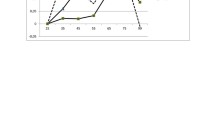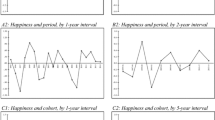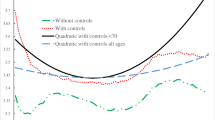Abstract
We introduce new indicators measuring relative age disadvantage of older compared with younger people at a national level. Drawing on data from 29 European countries, the study demonstrates that there is no consistent relative old age disadvantage with regard to the four indicators selected: satisfaction in life, perceived prejudice, perceived access to health services, and subjective income. Relative age disadvantages (i.e. the status of those aged 30–45 divided by the status of older adults aged 60–75) correlated negatively with overall levels of happiness at the country level. Multi-level analyses revealed cross-level interactions, indicating that countries with higher levels of relative age disadvantage were characterized by a more negative relation between age and happiness at the individual level. Our findings highlight a need to further investigate relative age disadvantages for understanding, describing, and potentially changing the situation of older people in modern societies.

Similar content being viewed by others
References
Adler NE, Epel ES, Castellazzo G, Ickovics JR (2000) Relationship of subjective and objective social status with psychological and physiological functioning: preliminary data in healthy, white women. Health Psychol 19:586
AgeInternational (2015). Global rankings table. Accessed online: http://www.helpage.org/global-AgeWatch/population-ageing-data/global-rankings-table/
Ayalon L (2008) Subjective socioeconomic status as a predictor of long-term care staff burnout and positive caregiving experiences. Int Psychogeriatr 20:521–537
Ayalon L (2014) Perceived age, gender, and racial/ethnic discrimination in Europe: results from the European social survey. Educ Gerontol 40:499–517
Ayalon L (2016) Perceived age discrimination: A precipitator or a consequence of depressive symptoms? J Gerontol B: Psychol Sci Soc Sci. https://doi.org/10.1093/geronb/gbw101
Ayalon L, Gum AM (2011) The relationships between major lifetime discrimination, everyday discrimination, and mental health in three racial and ethnic groups of older adults. Aging Ment Health 15:587–594
Ayalon L, Doron I, Bodner E, Inbar N (2014) Macro-and micro-level predictors of age categorization: results from the European social survey European. Eur J Ageing 11:5–18
Barrett AE, Montepare JM (2015) “It’s about time”: applying life span and life course perspectives to the study of subjective age. Annu Rev Gerontol Geriatrics 35:55–77
Blanchflower DG, Oswald AJ (2008) Is well-being U-shaped over the life cycle? Soc Sci Med 66:1733–1749. https://doi.org/10.1016/j.socscimed.2008.01.030
Boudiny K (2013) ‘Active ageing’: from empty rhetoric to effective policy tool. Ageing Soc 33:1077–1098
Burchardt T (2006) Foundations for measuring equality: A discussion paper for the equalities review LSE STICERD Research Paper No CASE111. http://eprints.lse.ac.uk/6236/1/Foundations_for_measuring_equality_A_discussion_paper_for_the_Equalities_Review.pdf
Chatterji S, Byles J, Cutler D, Seeman T, Verdes E (2015) Health, functioning, and disability in older adults—present status and future implications. Lancet 385:563–575
Cherubini A, Signore SD, Ouslander J, Semla T, Michel J-P (2010) Fighting against age discrimination in clinical trials. J Am Geriatr Soc 58:1791–1796. https://doi.org/10.1111/j.1532-5415.2010.03032.x
Dahlin J, Härkönen J (2013) Cross-national differences in the gender gap in subjective health in Europe: Does country-level gender equality matter? Soc Sci Med 98:24–28
Eaton AA, Visser PS, Krosnick JA, Anand S (2009) Social power and attitude strength over the life course. Pers Soc Psychol Bull 35:1646–1660
ESS Round 4: European Social Survey Round 4 Data (2008) Data file edition 4.4. NSD - Norwegian Centre for Research Data, Norway – Data Archive and distributor of ESS data for ESS ERIC
Eymard AS, Douglas DH (2012) Ageism among health care providers and interventions to improve their attitudes toward older adults: an integrative review. J Gerontol Nurs 38:26–35
Geske Dijkstra A (2006) Towards a fresh start in measuring gender equality: a contribution to the debate. J Hum Dev 7:275–283
Hartog J, Oosterbeek H (1998) Health, wealth and happiness: why pursue a higher education? Econ Educ Rev 17:245–256
Hosseinpoor AR, Bergen N, Schlotheuber A (2015) Promoting health equity: WHO health inequality monitoring at global and national levels. Glob Health Action 8
Jermyn D (2013) Past their prime time?: women, ageing and absence on british factual television. Crit Stud Telev Int J Telev Stud 8:73–90
Jütting JP, Morrisson C, Dayton-Johnson J, Drechsler D (2008) Measuring gender (in) equality: the OECD gender, institutions and development data base. J Hum Dev 9:65–86
Kite ME, Johnson BT (1988) Attitudes toward older and younger adults: a meta-analysis. Psychol Aging 3:233–244
Kornadt AE, Rothermund K (2012) Internalization of age stereotypes into the self-concept via future self-views: a general model and domain-specific differences. Psychol Aging 27:164
Kornadt AE, Rothermund K (2015) Views on aging: domain-specific approaches and implications for developmental regulation. Ann Rev Gerontol Geriatr 35:121–144
Kotter-Grühn D, Hess TM (2012) The impact of age stereotypes on self-perceptions of aging across the adult lifespan. J Gerontol B Psychol Sci Soc Sci 67:563–571. https://doi.org/10.1093/geronb/gbr153
Lachman ME, Teshale S, Agrigoroaei S (2015) Midlife as a pivotal period in the life course: balancing growth and decline at the crossroads of youth and old age. Int J Behav Dev 39:20–31. https://doi.org/10.1177/0165025414533223
Lakra DC, Ng R, Levy BR (2012) Increased longevity from viewing retirement positively. Ageing Soc 32:1418–1427
Levy BR (2009) Stereotype embodiment: a psychosocial approach to aging. Curr Dir Psychol Sci 18:332–336
Levy BR, Slade MD, Kunkel SR, Kasl SV (2002) Longevity increased by positive self-perceptions of aging. J Pers Soc Psychol 83:261
Lynch SM (2003) Cohort and life-course patterns in the relationship between education and health: a hierarchical approach. Demography 40:309–331
MacGregor D (2006) Editorial: neglecting elders in the workplace: civil society organizations, ageism, and mandatory retirement. Can J Aging 25:243–246
McNally M, Lahey W (2015) Frailty’s place in ethics and law: some thoughts on equality and autonomy and on limits and possibilities for aging citizens. Interdiscip Top Gerontol Geriatr 41:147–185
Mégret F (2011) The human rights of older persons: a growing challenge human rights. Law Rev 11:37–66. https://doi.org/10.1093/hrlr/ngq050
Ng SH (1998) Social psychology in an ageing world: ageism and intergenerational relations. Asian J Soc Psychol 1:99–116
Palmore E (2015) Ageism comes of age. J Gerontol B Psychol Sci Soc Sci 70:873–875. https://doi.org/10.1093/geronb/gbv079
Prilleltensky I (2008) The role of power in wellness, oppression, and liberation: the promise of psychopolitical validity. J Community Psychol 36:116–136. https://doi.org/10.1002/jcop.20225
Rathmann K et al (2015) Macro-level determinants of young people’s subjective health and health inequalities: a multilevel analysis in 27 welfare states. Maturitas 80:414–420
Rothermund K, Brandtstädter J (2003) Age stereotypes and self-views in later life: evaluating rival assumptions. Int J Behav Dev 27:549–554. https://doi.org/10.1080/01650250344000208
Schermuly CC, Deller J, Büsch V (2014) A research note on age discrimination and the desire to retire: the mediating effect of psychological empowerment. Res Aging 36:382–393
Shortt S (2001) Venerable or vulnerable? Ageism in health care Journal of health services. Res Policy 6:1–2
Snyder K (2015) Is younger really better? Age differences in emotion perception
Vaillant G (2011) The happiness effect. Bull World Health Organ 89:246–247
Voss P, Wolff JK, Rothermund K (2016) Relations between views on ageing and perceived age discrimination: a domain-specific perspective. Eur J Ageing 14:5-15
Westerhof GJ et al (2014) The influence of subjective aging on health and longevity: a meta-analysis of longitudinal data. Psychol Aging 29:793
Wilkinson RG, Pickett KE (2006) Income inequality and population health: a review and explanation of the evidence. Soc Sci Med 62:1768–1784
Wilkinson RG, Pickett KE (2007) The problems of relative deprivation: why some societies do better than others. Soc Sci Med 65:1965–1978. https://doi.org/10.1016/j.socscimed.2007.05.041
Yuan ASV (2007) Perceived age discrimination and mental health. Soc Forces 86:291–311
Zaidi A (2014) Enabling environments for active and healthy ageing in EU countries. Gerontechnology 12:201–208
Acknowledgements
Funding was provided by European Cooperation in Science and Technology (Grant No. IS1402).
Author information
Authors and Affiliations
Corresponding author
Additional information
Responsible Editor: H.-W. Wahl.
Rights and permissions
About this article
Cite this article
Ayalon, L., Rothermund, K. Examining the utility of national indicators of relative age disadvantage in Europe. Eur J Ageing 15, 189–197 (2018). https://doi.org/10.1007/s10433-017-0435-2
Published:
Issue Date:
DOI: https://doi.org/10.1007/s10433-017-0435-2




